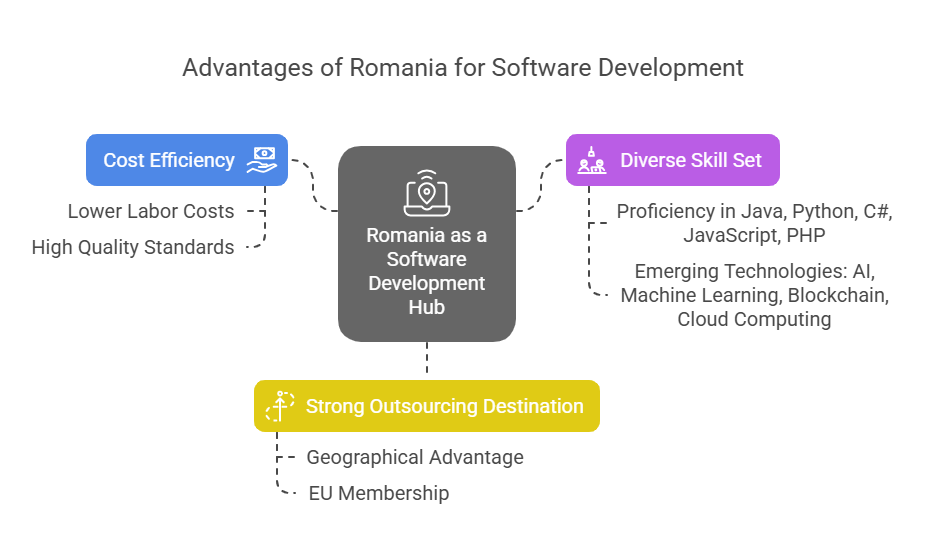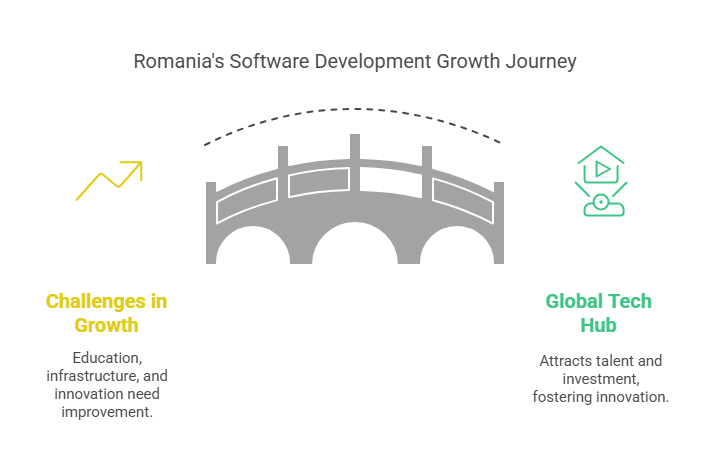Romania’s software development industry is no longer a hidden gem—it’s a full-fledged tech powerhouse that has captured the attention of global enterprises, startups, and investors alike. With a unique combination of technical talent, cost efficiency, and a rapidly evolving innovation ecosystem, Romania has become a critical player in the global tech landscape. But what lies beneath this success? This article takes a deep dive into the factors driving Romania’s software development sector, the challenges it faces, and the opportunities that lie ahead.
The Foundations of Romania’s Tech Success
1. A Legacy of Technical Excellence
Romania’s strength in software development is rooted in its long-standing tradition of excellence in mathematics, engineering, and computer science. During the communist era, the country invested heavily in technical education, creating a strong foundation for scientific and engineering disciplines. After the fall of communism, this legacy evolved into a thriving IT sector, as Romanian engineers and developers began to embrace the opportunities of the digital age.
Today, Romania is home to some of the most prestigious technical universities in Eastern Europe, including the University Politehnica of Bucharest, Babeș-Bolyai University in Cluj-Napoca, and the Technical University of Iași[ASS1] . These institutions produce thousands of highly skilled graduates annually, many of whom go on to work in software development, artificial intelligence, cybersecurity, and other cutting-edge fields.
2. A Multilingual and Culturally Aligned Workforce
Romanian developers are not only technically proficient but also culturally aligned with Western markets. Many Romanians speak English fluently, along with other European languages like German, French, and Italian. This linguistic versatility makes it easier for Romanian tech companies to collaborate with international clients and integrate into global teams.
Moreover, Romanian developers are known for their strong work ethic, adaptability, and problem-solving skills. These qualities have made them highly sought after by companies looking for reliable and innovative partners.
The Rise of Tech Hubs Across Romania
Romania’s software development industry is not concentrated in a single city but spread across multiple tech hubs, each with its own unique strengths:
- Bucharest: As the capital and largest city, Bucharest is the epicenter of Romania’s tech industry. It hosts the headquarters of major multinational companies like Microsoft, Oracle, and IBM, as well as a vibrant startup scene. The city’s infrastructure, access to talent, and proximity to European markets make it a prime location for tech companies.
- Cluj-Napoca: Often referred to as the “Silicon Valley of Eastern Europe,” Cluj-Napoca has become a hotspot for tech innovation. The city is home to a growing number of startups, tech incubators, and research centers. Its strong academic institutions and high quality of life have attracted both local and international talent.
- Timișoara: Known for its engineering heritage, Timișoara has emerged as a key player in software development and IT outsourcing. The city’s tech community is tightly knit, with a focus on collaboration and innovation.
- Iași: With a strong academic tradition and a lower cost of living, Iași has become an attractive destination for tech companies looking to tap into a pool of young, talented developers.
These tech hubs are interconnected, creating a nationwide ecosystem that fosters innovation and collaboration. This decentralization has also helped to distribute economic growth more evenly across the country.
Why Companies Choose Romania for Software Development
1. Cost Efficiency Without Compromising Quality
One of the most compelling reasons companies choose Romania for software development is its cost-effectiveness. Compared to Western Europe and North America, Romania offers significantly lower labor costs while maintaining high standards of quality. This makes it an ideal destination for businesses looking to optimize their development budgets without sacrificing performance.
2. A Diverse Skill Set
Romanian developers are proficient in a wide range of technologies and programming languages, including Java, Python, C#, JavaScript, and PHP. They are also increasingly skilled in emerging fields like artificial intelligence, machine learning, blockchain, and cloud computing. This versatility allows Romanian tech companies to tackle complex projects across various industries, from finance and healthcare to gaming and e-commerce.
3. A Strong Outsourcing and Nearshoring Destination
Romania’s geographical location in Eastern Europe makes it an attractive nearshoring destination for companies in Western Europe. With similar time zones and easy access via short flights, collaboration is seamless. Additionally, Romania’s membership in the European Union ensures compliance with EU regulations and data protection standards, providing an added layer of security for businesses.

Innovation and Startups: Romania’s Homegrown Success Stories
While outsourcing and nearshoring have been significant drivers of Romania’s tech industry, the country is also making a name for itself as a hub of innovation. Romanian startups are gaining international recognition for their creativity and technical prowess. One standout example is UiPath, a global leader in robotic process automation (RPA) that was founded in Bucharest. UiPath’s success has put Romania on the map as a source of cutting-edge technology and innovation.
Other notable Romanian startups include:
- Bitdefender: A cybersecurity company known for its advanced antivirus software.
- FintechOS: A platform that enables banks and insurers to launch innovative financial products quickly.
These success stories have inspired a new generation of entrepreneurs, leading to a surge in startup activity across the country. Incubators, accelerators, and venture capital funds are also playing a crucial role in supporting early-stage companies.
Challenges Facing Romania’s Software Development Industry
Despite its many strengths, Romania’s software development industry is not without its challenges:
1. Brain Drain
One of the most pressing issues is the emigration of skilled professionals to Western Europe and North America in search of higher salaries and better opportunities. This brain drain has created a talent shortage in some areas, forcing companies to compete fiercely for top talent.
2. Infrastructure Gaps
While major cities like Bucharest and Cluj-Napoca have modern infrastructure, other regions still lag behind. Improving transportation, internet connectivity, and access to resources in smaller cities could help distribute growth more evenly across the country.
3. Keeping Pace with Technological Change
The rapid pace of technological advancement requires continuous upskilling and investment in research and development. Romanian companies and educational institutions must prioritize lifelong learning and innovation to remain competitive.
The Future of Software Development in Romania
The future looks bright for Romania’s software development industry. With a strong foundation of technical talent, a growing startup ecosystem, and increasing international recognition, the country is well-positioned to solidify its status as a global tech hub.
To sustain this growth, Romania must address its challenges head-on. This includes investing in education and training, improving infrastructure, and creating an environment that encourages innovation and entrepreneurship. By doing so, Romania can not only retain its top talent but also attract even more investment and partnerships from around the world.

Conclusion
Romania’s software development industry is a testament to the country’s resilience, ingenuity, and ambition. From its roots in technical education to its current status as a global tech hub, Romania has come a long way in a relatively short time. As the industry continues to evolve, Romania has the potential to become not just a regional leader but a global force in software development and innovation. For businesses and developers alike, Romania offers a unique blend of talent, creativity, and opportunity that is hard to match. The future of tech is being written in Romania—and the world is taking notice.
FAQs About Software Development in Romania
1. Why is Romania a popular destination for software development?
Romania has become a popular destination for software development due to its highly skilled workforce, competitive costs, and strong technical education system. The country is home to a large pool of talented developers proficient in a wide range of technologies, making it an attractive choice for businesses looking for quality and affordability.
2. What are the main tech hubs in Romania?
Romania’s software development industry is spread across several key cities, including:
- Bucharest: The capital and largest tech hub, hosting multinational companies and startups.
- Cluj-Napoca: Known as the “Silicon Valley of Eastern Europe,” with a vibrant startup ecosystem.
- Timișoara: A city with a strong engineering heritage and a growing IT sector.
- Iași: A rising tech hub with a focus on research and development.
3. What programming languages and technologies are Romanian developers skilled in?
Romanian developers are proficient in a wide range of programming languages and technologies, including:
- Programming Languages: Java, Python, C#, JavaScript, PHP, and more.
- Emerging Technologies: Artificial intelligence (AI), machine learning (ML), blockchain, cloud computing, and cybersecurity.
4. How does Romania compare to other outsourcing destinations?
Romania stands out due to its combination of technical expertise, cultural alignment with Western markets, and cost efficiency. Compared to other outsourcing destinations, Romania offers high-quality services at competitive rates, making it a preferred choice for nearshoring and offshoring.
5. What industries benefit from software development in Romania?
Romanian software development services cater to a wide range of industries, including:
- Finance and Banking: Fintech solutions, payment systems, and blockchain applications.
- Healthcare: Healthtech platforms, telemedicine, and medical software.
- E-commerce: Online marketplaces, payment gateways, and customer management systems.
- Gaming: Game development, virtual reality (VR), and augmented reality (AR) solutions.
- Automotive: Software for autonomous vehicles, IoT, and connected car technologies.
6. What are the advantages of nearshoring to Romania?
Nearshoring to Romania offers several advantages, including:
- Proximity: Similar time zones and short travel distances to Western Europe.
- Cultural Alignment: Strong English language skills and cultural compatibility.
- Cost Efficiency: Lower development costs compared to Western Europe and North America.
- EU Membership: Compliance with EU regulations and data protection standards.
7. Are there any challenges to working with Romanian software development companies?
While Romania offers many benefits, there are some challenges to consider:
- Brain Drain: Some skilled professionals emigrate to other countries for higher salaries.
- Talent Competition: High demand for top talent can make recruitment competitive.
- Infrastructure: While major cities have modern infrastructure, smaller regions may lag behind.
8. How does Romania support innovation in software development?
Romania fosters innovation through:
- Government Initiatives: Tax incentives, grants, and funding programs for startups.
- Tech Events: Hackathons, conferences, and meetups that encourage collaboration.
- Educational Institutions: Universities and research centers that focus on cutting-edge technologies.
- Startup Ecosystem: Incubators, accelerators, and venture capital funding for early-stage companies.
9. What are some successful Romanian tech companies?
Romania is home to several successful tech companies, including:
- Bitdefender: A leading cybersecurity company.
- Endava: A provider of digital transformation services.
- FintechOS: A platform for launching innovative financial products.
10. How can I hire software developers in Romania?
To hire software developers in Romania, you can:
- Partner with Local Companies: Work with established Romanian software development firms.
- Use Recruitment Agencies: Engage agencies specializing in IT talent.
- Leverage Online Platforms: Use platforms like LinkedIn, Toptal, or Upwork to find developers.
- Attend Tech Events: Network at conferences and meetups to connect with talent.
11. What is the future of software development in Romania?
The future of software development in Romania looks promising, with continued growth in areas like AI, blockchain, and cloud computing. The country is also expected to strengthen its position as a global tech hub by addressing challenges like brain drain and infrastructure gaps, while fostering innovation and entrepreneurship.
12. How does Romania’s education system contribute to its tech industry?
Romania’s education system plays a crucial role in its tech industry by producing highly skilled graduates in fields like computer science, engineering, and mathematics. Universities collaborate with tech companies to provide practical training and internships, ensuring that graduates are job-ready.
13. What are the costs of software development in Romania?
Software development costs in Romania are generally lower than in Western Europe and North America, while maintaining high quality. Rates vary depending on the complexity of the project, the experience of the developers, and the location of the company.
14. Is Romania a good place for startups?
Yes, Romania is an excellent place for startups due to its:
- Talent Pool: Access to skilled developers and engineers.
- Support Ecosystem: Incubators, accelerators, and funding opportunities.
- Innovation Culture: A growing community of entrepreneurs and tech enthusiasts.
15. How does Romania ensure data security and compliance?
As an EU member state, Romania adheres to strict data protection regulations, including the General Data Protection Regulation (GDPR). Romanian software development companies prioritize data security and compliance, making them reliable partners for businesses handling sensitive information.
